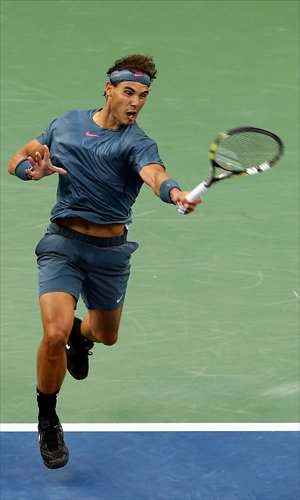HOME >> SPORTS
Nadal crowns his ‘most emotional season’ ever
Source:Reuters-Global Times Published: 2013-9-13 5:03:02

Rafael Nadal of Spain plays a forehand during his men's singles final match of the 2013 US Open against Novak Djokovic of Serbia on Monday in New York City. Photo: CFP
Engulfed in a mixture of relief and utter joy, Rafael Nadal fell on his back and covered his face with his hands after beating Novak Djokovic in four sets to win the US Open, the 13th grand slam title of his career.A year ago, Nadal was sat at home watching on television as Andy Murray defeated Djokovic, dealing with the knee injuries which had raised questions over his longevity in the sport.
But after returning to the game from a seven-month absence, Nadal's remarkable year has included two grad slam wins as he marches his way towards the number one ranking again.
"For a few things this season is probably the most emotional one in my career," Nadal told reporters after his 6-2, 3-6, 6-4, 6-1 victory.
"I felt that I did everything right to have my chance here.
"You play a match against one of the best players of the history like this, Novak, No.1 in the world, probably on his favorite surface, as I said the other day, I would have to be almost perfect to win.
"It means a lot for me have this trophy. It is just amazing," he said.
Giving no quarter
Nadal gives no quarter on the court and he is similar when asked to talk about his fears, avoiding the temptation to tell the easy story lines.
Did he fear he might never play again?
"I am a positive guy, so I never thought about that," he replied with his disarming smile.
But he acknowledged that the emotions he showed on court did indeed relate back to his injuries and to the difficult days in the gym, when he had to endure the daily grind of rehab work, sometimes with no signs of immediate progress.
So when he thanked his staff and those close to him, it was not the usual courtesy but an acknowledgement that the painful road back would have been much tougher without the support of his team and family.
"What really produced for me these emotional moments was working hard in tough moments, trying to be positive," he added.
"A lot of people were with me during this period of time and they were not easy moments. A lot of days I was able to keep working because of them.
"When you go to the gym every day and you don't see a positive result, then you lose a little bit your energy. Having those people around me during this period of time was decisive.
"They kept me working hard, they give me that positive energy. Without them it would be impossible for me to have the chance to be here today."
Staying healthy
Once he got back on court in February, Nadal says his doubts and fears eased.
"When I came back to Chile for the first tournament I said, 'well, the most important thing is to be healthy.' I am sure that I will not forget how to play tennis in seven months," Nadal said.
"The most important thing and the most difficult thing is be healthy. If you are healthy, if you have been in the top positions for nine years already or eight years and you stop for seven months, why will you not have the chance to be back there?"
But coming back and being competitive is one thing, winning Masters Series events at Indian Wells, Madrid, Rome, Montreal and Cincinnati and those triumphs at Roland Garros and Flushing Meadows, going 60-3 in the year so far, is another thing all together.
"I felt confident that if I am healthy I will keep having chances to compete for the tournaments. But winning two grand slams in the year is something that I never thought.
"Did I think if I am healthy would I compete well again? Yes. But not as early as I did. I never thought to have that.
"But after three or four, five months of competition, I felt confident that I will have the chance to be back playing at the good level," he said.
Nadal is now just four short of Roger Federer's 17 slam titles and while his old rival is looking a fading force at the moment, Monday's triumph suggested the Spaniard, if the knees play their part, can go on to become the most successful of all.
The 27-year-old not only looks hungry and motivated but, as he acknowledged, has added an extra edge of aggression to an already combative game.
"It's true that I am playing a little bit more aggressive than before. But for the rest, everything is as usual."
Reuters - Global Times
Posted in: Feature, Tennis